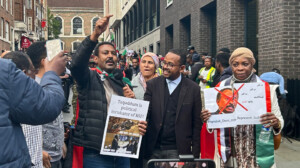Protests continue in Sudan amid ‘unprecedented price increases’
On Monday, protests erupted in Khartoum, Omdurman, and El Obeid, capital of North Kordofan, against the continuing shortages of bread and fuel. Food prices doubled again. In Suakin in Red Sea state, people barricaded roads on Sunday in protest against the water crisis.
 Queuing to buy bread in El Obeid, capital of North Kordofan, January 2017 (RD)
Queuing to buy bread in El Obeid, capital of North Kordofan, January 2017 (RD)
On Monday, protests erupted in Khartoum, Omdurman, and El Obeid, capital of North Kordofan, against the continuing shortages of bread and fuel. Food prices doubled again. In Suakin in Red Sea state, people barricaded roads on Sunday in protest against the water crisis.
The markets in Khartoum and other places in the country are witnessing an unprecedented rise in the prices of basic commodities.
“Prices have doubled, and in some cases tripled,” a protestor complained to Radio Dabanga from Omdurman. “Many families who were already eating only one meal per day, now really don’t know how to survive anymore.”
In Khartoum state, some 2,000 bakeries closed their doors due to the flour crisis. Some fights erupted among people queuing for hours in front of the few bakeries that are still working.
At Street 40, a main transit road in Omdurman, protests against the bread crisis resulted in clashes between policemen and protesters. The police fired tear gas intensively to disperse the crowd that called for the fall of the current government of Prime Minister Abdallah Hamdok. A number of protesters blocked the road.
Similar protests against the deteriorating living conditions took place at El Soug El Arabi in central Khartoum.
Protestors El Shagla, El Salha and El Fitihab districts in Omdurman blocked a number of main roads in yesterday in protest against the drinking water outages that started 10 days ago, in addition to the continuing shortages bread, and fuel.
The city also witnessed sporadic protests at bus stops and stations, as the means for transportation diminished due to the fuel crisis.
Petrol stations Khartoum, Omdurman, and Khartoum Bahri (North) witnessed long lines of vehicles waiting to obtain fuel for days.
The head of the Khartoum state Transportation Chamber holds the Ministry of Energy responsible for the fuel crisis. He estimated the percentage of the petrol and diesel deficit at about 70 per cent, and pointed to the ensuing tariff increases and cuts in the bus routes.
No subsidised bread anymore
People in El Obeid in North Kordofan state are suffering from a severe bread crisis since yesterday.
Ali Ibrahim, a leader member of the Forces for Freedom and Change in North Kordofan, told Radio Dabanga that the city witnessed “a complete lack of subsidised bread, while the price of a small loaf on the market rose to SDG6*”.
The daily costs of bread for an average family amounts to SDG300, he said. “Many families are not able anymore to bear the costs.”
In Suakin, near Port Sudan in Red Sea state, people blocked the Khartoum-Port Sudan highway on Sunday, in protest against the lack of drinking water in the town.
The commercial price of a bucket of drinking water that jumped last week from SDG50 to SDG120, rose over the weekend to SDG150. “More people now are using salt water, which is cheaper,” journalist Mohamed Osheik told Radio Dabanga.
Salaries
Employees working for the Auditor General all over the country began a strike on Monday. Team heads and auditors came from the states to Khartoum to underline their demands concerning the implementation of their salary structure and the amendment of the Constitutional Document regarding the appointment of the Auditor General.
The appointment of the Auditor General by the Council of Ministers should obtain the approval of two-thirds of the members of the legislature, and of the members of the Sovereign Council, in order to comply with the Auditor General Office Act of 2015.
The auditors wonder why the Auditor General and his deputies are allowed to keep their positions despite the passage of more than a year since the formation of the civilian government, and the establishment of the Empowerment* Elimination, Anti-Corruption, and Funds Recovery Committee by the new government in the end of last year, with the aim to purge Sudan of the remnants of the Al Bashir regime.
* As effective foreign exchange rates can vary in Sudan, Radio Dabanga bases all SDG currency conversions on the daily middle US Dollar rate quoted by the Central Bank of Sudan (CBoS). USD 1 = SDG 55 at the time of publishing this article. At the parallel market in Khartoum, the greenback is selling for around SDG250 (a record height of SDG260 was reported on September 10).
** Empowerment (tamkin) is the term with which the ousted government of Omar Al Bashir supported its affiliates in state affairs by granting them far-going privileges, including government functions and the setting-up of various companies.
Radio Dabanga’s editorial independence means that we can continue to provide factual updates about political developments to Sudanese and international actors, educate people about how to avoid outbreaks of infectious diseases, and provide a window to the world for those in all corners of Sudan. Support Radio Dabanga for as little as €2.50, the equivalent of a cup of coffee.












 and then
and then